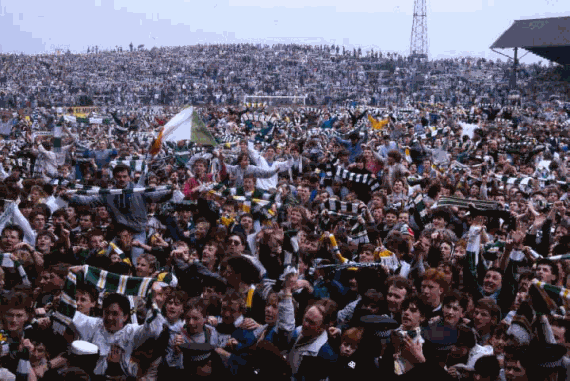Obviously, losing Rangers is a problem. It shouldn’t be, but it clearly is. Celtic Football Club may exist in a joyous state without its bigoted neighbours, but a large proportion of the supporters cannot. For all the apprehension attached to a Glasgow derby, a home match against Dundee on a Saturday in September, accompanied by a handful of travelling fans, limps along tamely in comparison. It’s like comparing poetry to a glossy magazine.
Celtic are locked within a problematic conundrum. Without the intensity and excitement of four Rangers games, the Champions League has become the epicentre of existence. It is the ripe apple within a sea of mouldy fruit, and it is the only competition in which Celtic will ensure capacity crowds. Yet, a lack of domestic crowds could lead to downsizing the playing staff due to the loss of revenue. This downsizing could result in Champions League qualification being out of reach. A season devoid of both Champions League football and Rangers matches is as exciting as toothache, yet this is a hypothetical reality.
Rangers, despite their hilarious league form, will return to the SPL. As unethical as it appears, a reconstruction will have been discussed the moment that they were placed in Division Three. It may only be two seasons, as opposed to three, that they are back in the SPL, further financial catastrophe notwithstanding. Do Celtic continue to finance a large squad in spite of dwindling crowds, running the risk of debt, or do they cut their cloth accordingly, resulting in a more competitive league but an infinitely weaker squad? What about the pricing structure?
Season ticket prices are too high. Let’s face it, the playing quality of the SPL is sub-standard, but Celtic fans do not pay money to see Inverness and St Mirren. This Celtic side is vibrant and fluid, so why are attendances decreasing? The SPL as a whole is arguably on a par with English League One (Celtic aside), and Celtic’s match day prices are comparable with the teams in this league. It is the season tickets, Fergus McCann’s great love affair, that Celtic need to readdress. The cheapest season ticket is the more expensive than all clubs in League One (and for less games), and dearer than the vast majority of Championship clubs. In comparison to the out of control English Premier League, the club’s pricing structure stands up well, with thirteen clubs having more expensive season tickets (cheapest option).
There are 15,000 surplus seats, on average, every home game, so why not utilise them? I had a brief discussion about this on twitter regarding giving away free tickets, and was quite shocked that some fans of a club that was founded with delightful, charitable intentions, could be so dismissive. The Kano Foundation is one example of a great, fan led initiative, but the club should be giving away thousands of tickets to schoolchildren. As was previously highlighted, simply assuming support amongst the future generations is a precarious approach. Fans cannot feel attached to a club without being in the stadium, so actively seek out the future lifeblood.
A further suggestion, and the one that caused the greatest consternation, was to offer 1000 free tickets to those seeking work, and a further 1000 to asylum seekers within the Glasgow area. The Guardian recently revealed that there are 20,000 benefit claimants within Glasgow alone. The high unemployment rate may be a factor in decreasing attendances, and supporters who can no longer attend should be given free tickets. The club may make money on pies and programmes, which is certainly preferable to seeing rows of green seats at Paradise. Someone on twitter ludicrously claimed that this initiative would see greater unemployment, as if the thought of free football tickets would encourage those under 25 to live on £56.25 a week, and those over 25 to live on £71 a week. A club entrenched in charity should never forget its roots.
Likewise, Celtic Football Club has always been a proud immigrant club, firstly being the social and moral hub for the Irish diaspora in Glasgow, and latterly as an institution open to all, regardless of religion and ethnicity. There are, on average, 2000 asylum seekers living in Glasgow. Social integration is a beautiful flower, and this needs to grow further. Free tickets to asylum seekers can only be a positive move. I simply cannot buy the counter argument of those who claim that free tickets for the less fortunate alienates those who pay, as the club needs to entice more fans whilst at the same time reducing the pricing structure of its existing ones.
Scottish football, from the scaremongering Armageddon predicted by a media who remain desperate to articulate its own decrepit sense of truth, is actually in a burgeoning condition. Pricing the lifeblood out of the game in a time of such excitement cannot be allowed to happen. For Celtic, a club whose attendances are expectedly suffering due to a perceived lack of excitement, alternative solutions that beautifully perpetuate the charitable aims first considered in the 1880s, should serve to reaffirm that football truly is nothing without the fans.





